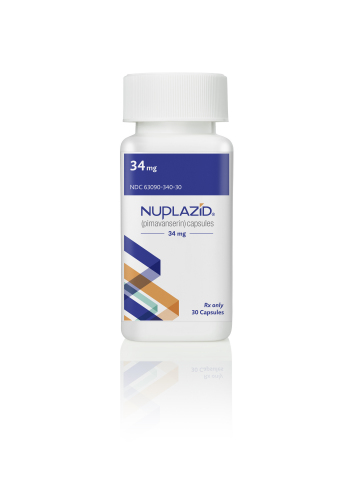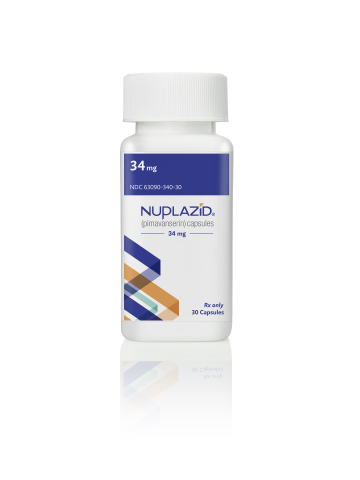SAN DIEGO--(BUSINESS WIRE)--ACADIA Pharmaceuticals Inc. (Nasdaq: ACAD) today announced FDA approval of a new capsule dose formulation and a new tablet strength of NUPLAZID (pimavanserin) to help in the treatment of patients living with hallucinations and delusions associated with Parkinson’s disease psychosis.
The FDA approval of a 34 mg NUPLAZID capsule formulation will provide patients with the recommended 34 mg once daily dose in a single, small capsule, reducing patient pill burden versus the current administration of two 17 mg tablets. In addition, the FDA approval of a 10 mg tablet provides an optimized lower dosage strength in those patients who are concomitantly receiving strong cytochrome 3A4 inhibitors which can inhibit the metabolism of NUPLAZID.
“We are very pleased with the FDA approval of the NUPLAZID 34 mg capsule and 10 mg tablet, underscoring ACADIA’s continued dedication to advancing safe and effective treatment options for patients living with hallucinations and delusions associated with Parkinson’s disease psychosis,” said Steve Davis, ACADIA’s President and Chief Executive Officer.
“NUPLAZID is a significant advance in our treatments for the hallucinations and delusions in Parkinson's disease,” said Dr. Joseph H. Friedman, Butler Hospital and Warren Alpert Medical School of Brown University. “The replacement of two 17 mg tablets with a single 34 mg capsule provides a simpler and more straightforward approach for the 34 mg once daily NUPLAZID dosing regimen, while also reducing the overall pill burden for my Parkinson’s disease patients who often also take multiple other medications concomitantly.”
The NUPLAZID 34 mg capsules and 10 mg tablets will be available by mid-August.
About Parkinson’s Disease Psychosis
According to the
Parkinson’s Foundation, about one million people in the United
States and from four to six million people worldwide suffer from
Parkinson’s disease. More than 50 percent of people with Parkinson’s
will experience symptoms of psychosis over the course of their disease.
PD Psychosis is characterized by hallucinations and delusions, is
associated with significant caregiver burden, and is a major reason for
nursing home placement among Parkinson’s patients.
About NUPLAZID® (pimavanserin)
NUPLAZID
is the first FDA-approved treatment for hallucinations and delusions
associated with Parkinson’s disease psychosis. NUPLAZID is a
non-dopaminergic, selective serotonin inverse agonist preferentially
targeting 5-HT2A receptors that are thought to play an
important role in Parkinson’s disease psychosis. NUPLAZID is an oral
medicine taken once a day with a recommended dose of 34 mg. ACADIA
discovered and developed this new chemical entity and holds worldwide
rights to develop and commercialize NUPLAZID.
About ACADIA Pharmaceuticals
ACADIA is a biopharmaceutical
company focused on the development and commercialization of innovative
medicines to address unmet medical needs in central nervous system
disorders. ACADIA has developed and is commercializing the first and
only medicine approved for the treatment of hallucinations and delusions
associated with Parkinson’s disease psychosis. In addition, ACADIA has
ongoing clinical development efforts in additional areas with
significant unmet need including dementia-related psychosis,
schizophrenia inadequate response, schizophrenia-negative symptoms and
major depressive disorder. This press release and further information
about ACADIA can be found at: www.acadia-pharm.com.
Forward-Looking Statements
Statements in this press release
that are not strictly historical in nature are forward-looking
statements. These statements include but are not limited to statements
related to the timing of the availability of 34 mg capsules and 10 mg
tablets of NUPLAZID, and the benefits to be derived from NUPLAZID. These
statements are only predictions based on current information and
expectations and involve a number of risks and uncertainties. Actual
events or results may differ materially from those projected in any of
such statements due to various factors, including the risks and
uncertainties inherent in drug discovery, development, approval and
commercialization, and the fact that past results of clinical trials may
not be indicative of future trial results. For a discussion of these and
other factors, please refer to ACADIA’s annual report on Form 10-K for
the year ended December 31, 2017 as well as ACADIA’s subsequent filings
with the Securities and Exchange Commission. You are cautioned not to
place undue reliance on these forward-looking statements, which speak
only as of the date hereof. This caution is made under the safe harbor
provisions of the Private Securities Litigation Reform Act of 1995. All
forward-looking statements are qualified in their entirety by this
cautionary statement and ACADIA undertakes no obligation to revise or
update this press release to reflect events or circumstances after the
date hereof, except as required by law.
Important Safety Information and Indication for NUPLAZID (pimavanserin)
WARNING: INCREASED MORTALITY IN ELDERLY PATIENTS WITH
DEMENTIA-RELATED PSYCHOSIS
Elderly patients with
dementia-related psychosis treated with antipsychotic drugs are at an
increased risk of death. NUPLAZID is not approved for the treatment of
patients with dementia-related psychosis unrelated to the hallucinations
and delusions associated with Parkinson’s disease psychosis.
NUPLAZID is an atypical antipsychotic indicated for the treatment of hallucinations and delusions associated with Parkinson’s disease psychosis.
Contraindication: NUPLAZID is contraindicated in patients with a history of a hypersensitivity reaction to pimavanserin or any of its components. Rash, urticaria, and reactions consistent with angioedema (e.g., tongue swelling, circumoral edema, throat tightness, and dyspnea) have been reported.
QT Interval Prolongation: NUPLAZID prolongs the QT interval. The use of NUPLAZID should be avoided in patients with known QT prolongation or in combination with other drugs known to prolong QT interval including Class 1A antiarrhythmics or Class 3 antiarrhythmics, certain antipsychotic medications, and certain antibiotics. NUPLAZID should also be avoided in patients with a history of cardiac arrhythmias, as well as other circumstances that may increase the risk of the occurrence of torsade de pointes and/or sudden death, including symptomatic bradycardia, hypokalemia or hypomagnesemia, and presence of congenital prolongation of the QT interval.
Adverse Reactions: The most common adverse reactions (≥2% for NUPLAZID and greater than placebo) were peripheral edema (7% vs 2%), nausea (7% vs 4%), confusional state (6% vs 3%), hallucination (5% vs 3%), constipation (4% vs 3%), and gait disturbance (2% vs <1%).
Drug Interactions: Coadministration with strong CYP3A4 inhibitors (e.g., ketoconazole) increases NUPLAZID exposure. Reduce NUPLAZID dose to 10 mg taken orally as one tablet once daily. Coadministration with strong CYP3A4 inducers may reduce NUPLAZID exposure. Monitor patients for reduced efficacy and an increase in NUPLAZID dosage may be needed.
Pediatric Use: Safety and efficacy have not been established in pediatric patients.
Dosage and Administration: Recommended dose: 34 mg taken orally once daily, without titration.
For additional Important Safety Information, including Boxed WARNING, please see the full Prescribing Information for NUPLAZID at https://www.nuplazid.com/pdf/NUPLAZID_Prescribing_Information.pdf.




